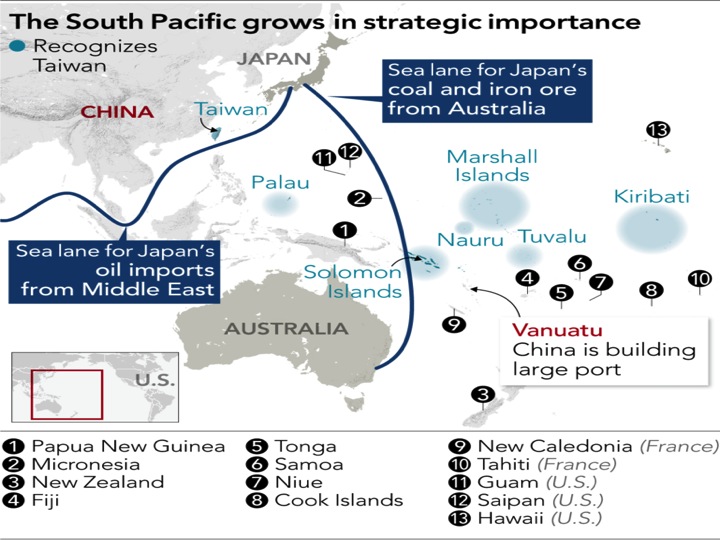My past research efforts have been mostly directed to Philippine environmental issues, maritime encroachment in Philippine waters as well as maritime safety issues as they impact the Philippines in both the West Philippine Sea as well as the China Sea to the north.
I have since broadened my research to not only maritime issues –from the West Philippine Sea to the Malacca Strait and surrounding waters– but also looking through a much wider view to include the North and South Pacific Oceans, Coral Sea, Philippine Sea, in consideration of the constant expansion efforts of China in this region, and elsewhere.
What is alarming is that China’s efforts are not being published on a wider global news scale. What I found were investigative reports through the Australian news and other sources. Chinese influence is expanding, trying to encompass portions of the Pacific Ocean, extending from south of Japan and Taiwan to the Island Nations East of Australia.
As reported by Australian news 60 Minutes, this is a summary of what I have found from their news broadcasts, and others.
Due to Chinese financial influence, the Solomon Islands have agreed to change their allegiance from Taiwan to China. Tulagi Island in the Solomons, with a deep water port, has been in its entirety leased by China. This action was ruled “unlawful” by a local court. Local residents say the lease signer has not been seen. Nothing has been done since the report was made public.
Chuuk Island is just over 2000 miles East of Manila and is set to vote for independent sovereignty early in 2020. Chuuk Island — one of the four states that make up the Federated States of Micronesia very close to Philippine Islands. Chuuk discussed a secession vote last year but punted to early 2020. If the island does end up seceding, it would break the U.S.-Micronesia COFA agreement and allow China to deal one-on-one with Chuuk, which has a deep-sea lagoon ideal for military operations.
A ban on Chinese tourists to the tiny Pacific nation of Palau has left hotels empty, an airline in limbo, and shown the power China has over its vacationing middle class.
Key-points: Palau is one of Taiwan’s 17 remaining allies in the world; China reportedly circulated a memo saying that tours to Palau would be punished; Palau Pacific Airways says it’s been forced to suspend operations because it can’t fill seats.
The Island nation of Kiribati has also changed allegiance from Taiwan to China.
The Island of Bougainville (soon to gain independence) east of Papua New Guinea has leased its huge copper and gold mine to China for restoration and re-activation with a long-term lease.
The Island of Vanuatu allowed China to construct a large deep water port –large enough to accommodate an aircraft carrier– to allow Chinese vessels safe port in the region. This is a bit curious as the Island of Vanuatu actually does not need a facility of this magnitude.
On Namotu Island in Fiji, a Chinese construction company has illegally cut through a pristine virgin coral reef system to get deep water access for the leased property. This property was intended for constructing a hotel/casino complex, but was conducted without permit, and resulted in the destruction of a huge section of the reef. Coral debris was used to construct a road through another owner’s property with impunity, and likewise without permission. They cut down many palm trees, cleared tropical forests, and destroyed a portion of the mangrove forest. Multiple government official orders to “cease operations” have been ignored. Destroyed too was a pristine beach in front of “Cloud-Break,” one of the world’s Top 10 surfing destinations.
One doesn’t have to look hard to find Chinese financial influence on a global level. Their efforts are visible in mining rare-earth minerals in Africa, to constructing a new maritime shipping canal cutting through Thailand to bypass the Malacca Strait.
In El Salvador, Chinese influence through financial support for its agriculture industry is quite concerning given El Salvador’s close proximity to the Panama Canal.
In the Philippines, Chinese influence is clearly visible through the casino/hotel/on-line gaming expansion; unrelenting coastline and riverbank dredging and hauling of sand; major deforestation to conduct mining in various highland areas, as well as incursions and ship “collisions” with Philippine vessels in its surrounding islands within its territorial waters, EEZ, or further out.
In my opinion, Chinese expansion is insidious with China’s focus on controlling regional sea-lanes, coupled with its aspirations towards attaining global domination. Should China succeed with their expansion efforts, they would have effectively surrounded the Philippine Islands as well as have great influence and leverage over many nations in this region. I believe a multi-country summit should be held to address the ongoing Chinese disregard and disrespect of other countries’ sovereignty, borders, and laws. More importantly, multi-country action should be taken to curb this aggression.
About the author: Timothy Muelder is a retired Facilities Manager of the U.S. Department of State.
